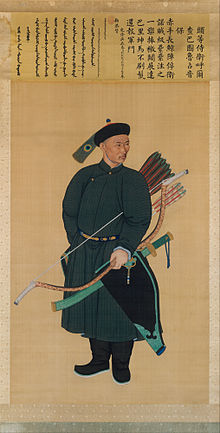Bodyguard
This article needs additional citations for verification. (June 2010) |
 Bodyguards with President Ronald Reagan moments before he was shot in March 1981 | |
| Occupation | |
|---|---|
| Names | Close protection officer, executive protection agent, personal protection specialist |
Occupation type | Government employment or private employment |
Activity sectors | Law enforcement, government, military, security |
| Description | |
Related jobs | Security guard, law enforcement officer, anti-terrorism specialist, intelligence officer |
A bodyguard (or close protection officer/operative) is a type of security guard, government law enforcement officer, or servicemember who protects an important person or group of people, such as high-ranking public officials, wealthy businesspeople, and celebrities, from harm. The personnel team that protects a VIP is often referred to as the VIP's security detail.
Most important public figures, such as heads of state, heads of government, and governors are protected by a team of bodyguards from a government agency, security forces, or police forces. Less-important public figures, or those with lower risk profiles, may be accompanied by a single bodyguard who doubles as a driver.
Bodyguards have existed since ancient civilizations, with notable examples including the Roman Praetorian Guard, Persian Immortals, and the Janissaries of the Ottoman Empire. These roles have evolved into modern executive protection professionals, equipped with advanced technologies and training.
Etymology
[edit]The term 'bodyguard' originates from the combination of 'body,' referring to the individual being protected, and 'guard,' signifying protection. While the term first appeared in English in the early 18th century, the concept predates the word by millennia.
Roles
[edit]









The work of a bodyguard consists mainly of planning routes, pre-searching rooms and buildings where the client will be visiting, researching the backgrounds of people that will have contact with the client, searching vehicles, and escorting the client on their day-to-day activities.[1] In the event of an emergency, a bodyguard's priority will always be to evacuate their client, rather than engage with threats.[2]
Modern executive protection extends beyond physical protection to include risk assessment, secure transportation, and coordination with event organizers to maintain a secure environment during public or private functions.[3]
Historical Examples
[edit]Throughout history, bodyguards have served pivotal roles in protecting rulers and influential figures. For instance:
- The Roman Praetorian Guard, established during the Roman Republic, provided security for emperors and wielded significant political power.
- The Persian Immortals, an elite military unit of the Achaemenid Empire, maintained the king's safety with a standing force of 10,000 soldiers.
- The Ottoman Janissaries, originally formed as the Sultan's personal guard, became a symbol of loyalty and military prowess.
- In Japan, samurai warriors served as bodyguards to daimyo (feudal lords), adhering to the Bushido code of honor.
Future Trends in Executive Protection
[edit]The future of executive protection is increasingly influenced by technology. Advancements such as artificial intelligence (AI), drones for surveillance, and biometric access controls are transforming the field. Additionally, the growing prevalence of digital threats has integrated cybersecurity measures into protection strategies, including encrypted communication and online threat monitoring.[4]
Legal and Practical Considerations
[edit]Legal requirements for bodyguards vary by country. For instance, in the United States, bodyguards may require state-specific licensing to carry firearms. In Brazil, private security professionals must pass rigorous background checks and receive official authorization to operate. These regulations ensure both compliance with local laws and the safety of clients.[5]
See also
[edit]- List of bodyguards
- List of protective service agencies
- Private investigator
- Private military company
- Secret service
- Security detail
- Security police—persons who guard government property.
- Royal guards
- Republican guard
- Witness protection
- Counterterrorism
- Tactics and skills
- Security company
- Regulation of private security guards
- fr:Conseil national des activités privées de sécurité (French regulator)
- Security Industry Authority (UK regulator)
- Particular units or kinds
- Housecarls (medieval Scandinavia and Anglo-Saxon England)
- Antrustion, the bodyguards of the Merovingian kings
- Praetorian Guard, the bodyguards of the Roman Emperors
- Rynda, ceremonial bodyguard of early Russian tsars
- Somatophylakes, the Macedonian bodyguard of Alexander the Great
- Spatharios, the bodyguard of Byzantine emperors
- Yojimbo, the Japanese word for bodyguard
- Pontifical Swiss Guard
- United Kingdom
- United States
- India
- National Security Guards (NSG) of the Ministry of Home Affairs (India), responsible for protecting the Prime Minister
- Special Protection Group (SPG), a specialized unit created after the Indira Gandhi assassination in 1984
- President's Bodyguards, a mechanized regiment of the Indian Army that is the ceremonial bodyguard of the President of India
References
[edit]- ^ "What's it like being a bodyguard?". BBC. April 4, 2011. Retrieved 2011-04-04.
- ^ Turk, Victoria. "How realistic is Bodyguard? A real Personal Protection Officer tells all". Wired. ISSN 1059-1028. Retrieved 2024-04-04.
- ^ Silva, Lucas (20 March 2024). "The History and Evolution of Bodyguards/Executive Protection". vanguardattache.com. Retrieved 22 January 2025.
- ^ Silva, Lucas (22 January 2025). "The History and Evolution of Bodyguards/Executive Protection". vanguardattache.com. Retrieved 22 January 2025.
- ^ Silva, Lucas (22 January 2025). "The History and Evolution of Bodyguards/Executive Protection". vanguardattache.com. Retrieved 22 January 2025.
